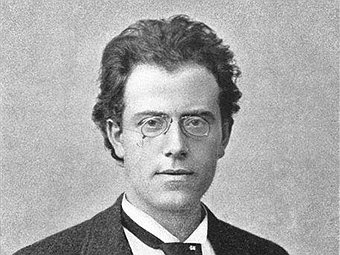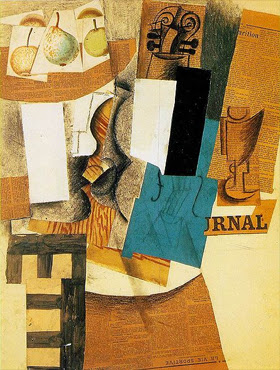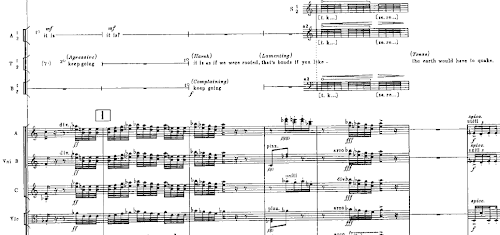



[tutti] oh peripeti [T1] nicht eilen, bitte [S1] oh [A1] no [B1] recht gemä... [S2] quatrième symphonie [A2] duxième symphonie [T2] recht gemä... [S1] deuxième partie [A1] première partie [T1] quatrième partie [B1] troisième partie [T2] gemäche... [B1] In ruhig fliessender Bewegung [T1] sehr gemächlich nicht eilen [B1] keep going [tutti] peripetie [B1] peripetie where? [A1] and now? [B1] nothing more nothing more restful than chamber music [A1] when now? [T1] I, say I
[T1] You are nothing but an academic exercise [B1] no time for chamber music {...} we need to do something [S2] For though the silence here is almost unbroken it is not completely so he emerges as from heavy hangings. Hardly a resurrection [A2] we want that [A1] It seems there are only repeated sounds [T2] what? [A2] who? [T1] I prefer a wake [T2] why? [B1] Something is going to happen. So after a period of immaculate silence there seems to be a violin concerto being played in the other room in three quarters [A2] two violin concertos [S2] in three eights [A1] I am not deaf, of that I am convinced, that is to say half-convinced [T2] Keep going [B2] where now? [T1] With not even a small mountain on the horizon, a man would wonder where his kingdom ended [A1] where? [T1] Keep going [T2] what? [T1] a poem [B2] Keep going [T1] a danced poem, all round, and endless chain, taking turns to talk
[S2] Keep going [T1] This represents at least a thousand words I was not counting on. [A1] three thousand notes [T1] I may well be glad of them {...} But seeing Daphne and Chloé written in red, counting the seconds while nothing has happened but the obsession with the [B1] go on [A2] with the chromatic [S2] and the chromatic again [T2] Where now? [T1] I am in the air, the walls, everything yields, opens, ebbs, flows like the play of waves [S1] Keep going [B2] Yes, I feel the moment has come for us to look back, if we can and take our bearings if we are to go on. [T1] Yes, I feel the moment has come for me to look back. I must not forget this, I have not forgotten it. But I must have said it before, since I say it now. They think I am alive, not in a womb, either...Well, so there is an audience it's a fantastic public performance [B1] and the curtain comes down for the ninth time. [B1] You never noticed you were waiting. You were waiting alone, that is the show. Keep going.
[B1] I shall say my old lessons now, if I can remember it [T2] then I shall have lived they think I am alive, not in a womb, either, even that takes time.
[A1] it is [T2] keep going [A1] is it? [B1] keep going [T1] it is as if we were rooted, that's bonds if you like – the earth would have to quake. it isn't the earth, one doesn't know what it is [A1] But you all know that they will bring me to the surface one day or another and there will be a brief dialogue in the dunes [T1] maybe a kind of competition on the stage, with just eight female dancers and words falling. you don't know where, where now [A1] under the sun [T1] who now? But now I shall say my old lessons if I can remember it. I most not forget this. But I must have said it before, since I say it now.
I am listening. Well, I prefer, that, I must say I prefer that [A2] that what who you [T1] oh you know, oh you, oh I suppose the audience, well well, so there is an audience, it's a public show, you buy your seat and you wait, perhaps it's free, a free show, you take your seat and you wait for it to begin, or perhaps it's compulsory, a compulsory show...
you wait for the compulsory show to begin, it takes time, you hear a voice, perhaps it is a recitation, that is the show, someone reciting, selected passages, old favourites, or someone improvising, you can barely hear him, that's the show, you can't leave, you are afraid to leave, you make the best of it, you try to be reasonable, you came too early, here we'd need latin, it's only the beginning, it hasn't begun, he'll appear any moment, he'll begin any moment [A1] He is only preluding, clearing his throat, alone in his dressing room, or it's the stage-manager giving his instructions, his last recommendations before the curtain rises [tutti] that is the show [T1] that's the show waiting for the show, to the sound of a murmur, you try to be reasonable, perhaps it is not a voice at all, perhaps it's the air, ascending, descending, flowing, eddying, seeking exit, finding none, and the spectators, where are they, you didn't notice, in the anguish of waiting, never noticed you were waiting alone, that is the show, for the fools, in the palace, waiting [B1] the brightest star [T1] waiting alone that is the show [tutti] that is the show [T1] waiting alone in the restless air, for it to begin, while every now and then a familiar passacaglia [T2] (etwas zurükhaltend) [B1] not really [T1] filters through the other noises waiting, for something to begin, for there to be something else but you, for the power to rise, the courage to leave, picking your way through the crossed colors, seeking the cause, losing it again, seeking no longer. We shall overcome the incessant noise, for as Henri says, if this noise would stop there'd be nothing more to say. You try and be reasonable, perhaps you are blind, probably deaf, the show is over, all is over, but where then is the hand, the helping hand, or merely charitable, or the hired hand, it's a long time coming, to take yours and draw you away, that is the show, free, gratis, and for nothing, waiting alone, blind, deaf, you don't know where, you don't know for what, for a hand to come and draw you away, somewhere else, where perhaps it's worse. [S1+2] It's a real pleasure upon my word it is to be unable to drown under such conditions in a lake full of colors far from my walls [T1] where now? [A1] who now? [B1] keep going now [T1] when now? [G1] blood [A1] Just a small murder [T1] keep going [B2] hardly worth it, yet what can you expect [T1] they don't know who they are either [B1] did you hear? [T1] keep going [S2] Did you hear? [T2] stop [B2] stop [A1] do you hear? [T1] keep going [B1] Hören Sie? [T2] Dort! [B2] Heavens! There was a sound! [T1] yes, there! [B1] Ja, dort! [T2] Jesus! Das war ein Ton!
I am here so little, I see it, I feel it round me it enfolds me, it covers me, if only this voice would stop, for a second, [T1+2] it would seem long to me, a second of silence I would listen, [T2] I'd know if it was going to start again or if it was stilled for ever what would I know it with, I'd know. And I'd keep on listening [T1] I'd know if it was going to start again it's late now, and he is still talking incessantly, any old thing, repetition after repetition, talking unceasingly, in yourself, outside yourself
It's late now, he shall never hear again the lowing cattle, the rush of the stream. In a chamber, dimensions unknown, I do not move and never shall again on long road or short. But the fact is I trouble no one. But I did. And after each group disintegration, the name of Majakowsky hangs in the clean air.
And when they ask, why all this, it is not easy to find an answer. [S2] la mer, la mer toujours recommencée [T1] For when we find ourselves, face to face, now, here, and they remind us all this can't stop the wars, can't make the old younger or lower the price of bread [A1] say it again, louder! [T1] it can't stop the wars, can't make the old younger or lower the price of bread, can't erase solitude or dull the tread outside the door, we can only nod, yes, it's true, but no need to remind, to point, for it is all with us, always, except, perhaps at certain moments, here among these rows of balconies, in a crowd or out of it, perhaps waiting to enter, watching. And tomorrow we'll read that ................ [mentions composer and title of a work included in the same program] made tulips grow in my garden and altered the flow of the ocean currents. We must believe it's true. There must be something else. Otherwise it would be quite hopeless. But it is quite hopeless. Unquestioning. But it can't go on. It, say it, not knowing what. It's getting late. Where now? When now? I have a present for you. Keep going, page after page. Keep going, going on, call that going, call that on. But wait. He is barely moving, now, almost still. Should I make my introductions? {This voice introduces to the public the other seven singers.} But now it's done, it's over, we've had our chance. There was even, for a second, hope of resurrection, or almost, Mein junges Leben hat ein End. We must collect our thoughts, for the unexpected is always upon us, in our rooms, in the street, at the door, on a stage. Thank you, Mr. {full name of the conductor}














Comments powered by CComment